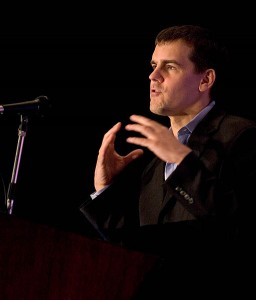 What we’ve suspected to be true at last has research to support its accuracy. Still, it remains a little hard to believe.
What we’ve suspected to be true at last has research to support its accuracy. Still, it remains a little hard to believe.
In discussing how basketball star Jeremy Lin almost didn’t get signed to the N.B.A., James Surowiecki at the New Yorker recently unearthed broader truths about how we work with attractive people.
The implications aren’t pretty.
The problems relate to what we do with others’ physical looks. On Lin, Surowiecki concludes:
As a reedy Asian-American (from Harvard, no less), Lin simply didn’t fit anyone’s image of an N.B.A. point guard.
Because many coaches harbor pre-conceived notions of what a star basketball player looks like, they initially overlooked — and missed out on — Lin. Meanwhile, Lin’s agent Roger Montgomery is having the last laugh.
The New Yorker staff writer expounds on the subject:
In the U.S., [economist Daniel Hamermesh] finds, better-looking men earn four per cent more than average-looking men of similar education and experience, and uglier men earn thirteen per cent less.
Whoa, right? It gets worse.
Height, too, affects how people do in the work force. Taller people get paid more, on average, and have a better chance of getting hired and of ending up in management positions.
You’ll probably find supporting evidence if you look around, true? To be sure, all of us have a certain height, and shades of good looks. Some just have more than others.
If you identify as having ample amounts of either, does it mean your achievements are based more on your looks than on your abilities? Surowiecki reports on the research:
Studies suggest that better-looking people are more confident, on average, which in some circumstances could translate into better performance.
Yet get this: the core problem lies within all of us. From Surowiecki’s article:
We tend to associate good looks with unassociated virtues. We assume that good-looking people are smarter and more effective than they really are, and that homely people are the reverse.
Could this be true? To determine for yourself, answer the following questions.
Do you:
- Nod in support at meetings whenever the looker sitting across the table says something, whether or not you agree?
- Overtly–or covertly–expect the tall upstart to become a manager?
- Give the cutie down the hall the benefit of the doubt when it comes to shoddy output?
- Readily direct your attention to that gorgeous teammate?
- Allow the hot number downstairs to take credit when it’s not due?
If you answered yes to any of these questions–as most of us will–you’re complicit in these dynamics. Shame on everybody right now!
Yet you’re not totally to blame. Many of us are socialized to prize those with physical gifts. And it’s natural to seek the peripheral benefits of associating with someone good looking, such as finding your way into the “in group” at work.
Which supports the increasing need to bring our whole selves to work. The more we leverage our full selves on the job, the more mindful we can be when relating to colleagues. This way we might sense when we’re connecting with coworkers’ physical attributes moreso than what’s inside, including their competence.
So the conclusion is obvious: always read Whole Wide Work.
You’ll learn how to access the full spectrum of your wherewithal at work, and as a result, you’ll reveal your own beauty.
Image via



